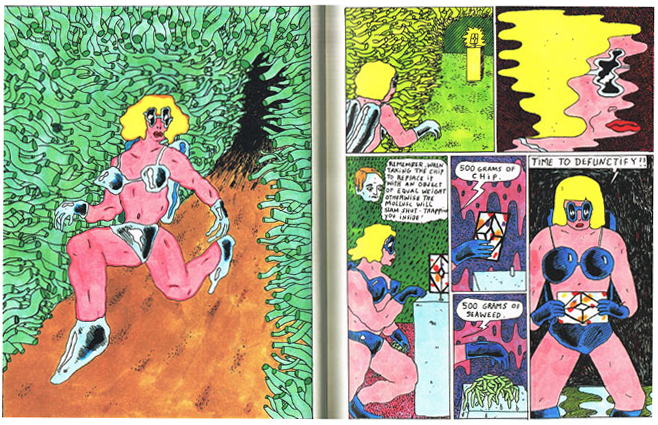Faschion Empire, sequel to the tale begun in last year’s refreshingly bizarre Motel Universe, extends cartoonist Joakim Drescher’s look at the ongoing intergalactic smackdown between good and evil, aka enslaved outcasts versus a pampered elite. This installment is another wild ride, with more intricate scenarios and all sorts of wonderfully weird new characters, including Andy Asteroid, Mr. Wiggles, and the tyrannical Glamula.
Though this installment opens with a brief synopsis of all that went before, it would help to read Motel Universe 1 first to get fully up-to-speed on all the events and thus acclimate to Drescher’s singular vision. The focus in Universe 2 is on Clara Clairvoyant, “the most feared bounty hunter in the Motel Universe.” She, along with her allies, sets out to capture the villainous Ghost of Caligula who (spoiler alert) escaped justice at the conclusion of book one. Clara’s first task is to find one Captain Littlehead, who can help lead her to Caligula. Captain Littlehead is also Clara’s long-lost love. But first, we get some of Clara’s backstory.
As a little girl, Clara watched helplessly as her journalist father and mother were arrested by the repressive Copy-Wrong Enforcers for writing an article in favor of freeing The Skins, the race of humanoids who were enslaved in the book 1. With this history, Drescher quickly establishes that Clara has a personal stake in her work to nab the Ghost of Caligula and fight injustice. Though she is one super-tough bounty hunter, she tears up thinking of her lover Captain Littlehead, who she fears is trapped in a sweatshop on a distant planet. “They think my heart is made of cold grey stone,” she reflects, tearfully. “But I’m a woman of flesh and blood!”
Clara’s hunt eventually lands her on Planet Pear, traveling twenty years forward in time. The planet, we learn, was founded by a group of Techies who built machines to make their lives easier. Over time, however, the machines dominate the Techies by keeping them pampered and docile via a simulated reality, with all manner of creature comforts. The situation is the worst for those in the planet’s lowest caste: “Having no need for (human) manual labor, the working class had no function…and so were—SOLD TO THE HIGHEST BIDDER!” These unfortunates are forced to slave away in a sweatshop sewing high fashion clothing (or high facshion—get it?) on nearby Planet Adonis. Clara and crew must first try to deactivate the simulated reality mechanism to free the populace, then continue on their quest to capture Caligula. But all sorts of very complicated complications ensue, including an encounter with the dreaded Faschion Empire on Planet Adonis, where the wrong outfit or bad hairdo will get you jail-time—or worse. The twists and turns of Drescher’s storyline are delightfully dizzying.

Throughout, Drescher sprinkles in wry parody and fun pop-cultural references. When Clara gets to choose a holographic representative of her ship’s operating system from a category of “Art, 20th Century Painters,” she picks pop artist Roy Lichtenstein (passing over luminaries such as Georgia O’Keefe and André Breton). To access the Lichtenstein hologram she must use the password “Appropriation-Not-Theft.” At another point, when our heroes become aware of something malevolent stalking them, Lichtenstein says, “Hold on, I’ve seen this one. A team picked off one by one by a creature in a ventilator shaft?”(A clear reference to Ridley Scott’s sci-fi-horror classic Alien).
Drescher also imbues all of this wackiness with political commentary. For instance, the Copy-Wrong Enforcers who bedevil Clara’s parents call up the vicious attacks on the free press currently being waged by our 45th president and his minions. Furthermore, the Skins and the sweatshop slaves of the Facshion Empire reflect the real-world reality of those on the lowest rungs of the opportunity ladder, grinding away at the dirtiest, most grueling tasks (aka essential services) so that the well-to-do can prosper. This aspect of the Motel Universe rings as true as any article in The Nation or Mother Jones. As Clara notes, “Every utopia is a garden nurtured with the blood of the powerless.”
Drescher’s narrative also acknowledges the unhappy fact that when one corrupt system of power is toppled, others—often worse—can spring up as replacements. But as in the first book, the universe of Drescher’s imagination is so layered with tongue-in-cheek, phantasmogorical minutiae that readers seeking pure escapism from our current global hellscape needn’t be triggered. On the other hand, by incorporating some real-world truths, Drescher avoids his story becoming a clever but airless batch of zany non-sequitors. The saga of Motel Universe may be go-for-broke-fantastical but it’s got some meat on its bones.

As in book 1, Drescher’s deadpan silliness is evident throughout. At one point, as Clara breaks deep into Planet Pear’s power center, she grumbles about the ghastly noise within: “It sounds like 100 accountants singing Rick Astley drunk through a kazoo!” (You have to admit that must sound really bad). And Drescher’s naïve style, surreal characters, and acid-trip landscapes remain as intoxicating as ever. Faschion Empire is a stone-cold treat. I’m so primed for book 3.








